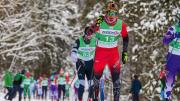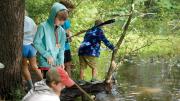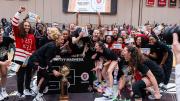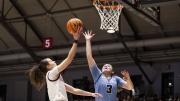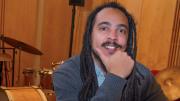Everyone has jitters in the moments before a mass-start cross-country ski race, and for good reason. When the gun goes off, dozens of competitors, with just a few feet of space between them, simultaneously accelerate—kicking and gliding forcefully as they convene into a narrowing track. With skis nearly touching, athletes fight to secure a spot as close to the front as possible. Collisions are common, as are NASCAR-style pileups that can take out a throng of competitors in an instant.
To avoid ending a race just as it begins, “You need to be constantly looking around at what everyone’s doing,” says James Kitch ’22 [’23], Harvard’s top Nordic skier. “One of my old coaches used to call it ‘swivel head.’ You need to be able to see that someone’s about to fall and get around them so that they don’t make you fall, too.”
Though half of collegiate cross-country skiing races begin with an interval start, sendng off each competitor 30 seconds apart, Kitch thrives most in the mass-start chaos. “It really becomes a competitive game,” he says. Throughout a race, he scans for drooping shoulders, asymmetric motion, slight breaks in form. When someone loses balance, an extra half-second of awareness is the difference between sticking with the pack and getting knocked off course. The alertness also comes in handy when deciding whether to tag along in the slipstream of another skier or, sensing his exhaustion, pushing toward the lead pack. Reaching the pinnacle of cross-country skiing is about knowing one’s strengths and exploiting them to exactly the proper degree at precisely the right time. It’s a marriage of self-knowledge and will that takes a lifetime to develop.
James Kitch’s parents joke that he could ski before he could walk. Amateur skiers themselves, they brought their baby son along with them on the trails near his hometown of Belmont, Massachusetts. “I would be in one of those carrier packs,” he says, “with the mittens and snow suit and everything.” When Kitch gained sufficient leg strength, he joined them on skis of his own. He was in second grade when a neighbor recommended he join the local youth skiing program. In addition to playing soccer and baseball through elementary and middle school, he skied around the nearby Weston Ski Track and with his family.
“Your first year of training year-round, you’re kind of feeling it out,” he says. “You have no idea, necessarily, what your body is telling you.”
By eighth grade, skiing was his primary sport. “It felt a bit more special,” he says—plus, he enjoyed the variety inherent in training. “So much of what is training for cross-country skiing is just going for a run, going for a hike, kayaking,” he says. “It can fit so much into your everyday life.”
In his first year with the junior program, as a high-school freshman, he set his goals high, aiming for a spot on the U16 national team. In his blind exuberance, he attempted to ski with his club’s fastest boys during his first distance workouts. On a two-and-a-half-hour ski—intended to be a long, steady effort—he would spend the first few minutes furiously trying to keep up, “and then I would blow up and dramatically reduce my pace.” At season’s end, he was “profoundly unsuccessful” in his attempt to make nationals.
But in finding his limit, Kitch had done himself a service. “Your first year of training year-round, you’re kind of feeling it out,” he says. “You have no idea, necessarily, what your body is telling you.” After that year, he had a better sense of when crushing a workout would help him reach a fitness peak or a fall into a trough of exhaustion.
He pushed himself more purposefully sophomore year. With guidance from his coach, he also embraced the “data side of the sport,” tracking his heart rate during workouts to assess how he could improve his pacing over different distances and intervals. (Kitch, now a junior in Cabot House who concentrates in statistics, credits the data with giving him a better sense of pacing.) He made nationals for the first time his high-school sophomore year and as a senior, he was an All-American in every event and the national champion in the sprint—a shorter race that he had struggled with earlier in his career.
Kitch decided on Harvard despite its relatively inaccessible ski terrain compared to schools like Utah, Vermont, Dartmouth, or Williams—all powers in the sport with significantly larger teams than Harvard’s current 20-student roster. But he was determined to make the city campus work even as some competitors and coaches expected him to take a step back. “I’ve trained here my whole life,” he says. “I became really, really motivated to prove people wrong.”
As a freshman, Kitch again set nationals as his ultimate goal. In the mass-start classic 20-kilometer races, he generally placed in the high single digits to low teens among a few dozen athletes—bettering the mid-teen finishes he’d need to qualify. In the interval-start freestyle 10-kilometer races, when he couldn’t rely on his group instincts, he fared significantly worse. With the two results combined at season’s end, he was one of the final qualifiers for nationals.
Kitch arrived at the March 2019 championship meet in Stowe, Vermont, feeling terrified. In the athlete tent, he heard competitors speaking Norwegian, Swedish, Russian. Some international seniors had begun college late and were now in their mid-twenties. After struggling with individual starts all year, Kitch was convinced he was going to come in last in the freestyle 10k. “My mentality the whole first race of NCAAs was thinking about how far the person ahead of me was…and whether or not I would be able to beat them so I wouldn’t be last,” he says. “And of course, that’s a horrible strategy to have.” He finished thirty-seventh among 40 competitors—a grateful non-last place.
Sophomore year, more experienced, Kitch began his autumn training careful not to exhaust himself early in his season. And in his second year working with Finnegan Nordic skiing head coach Chris City ’94, they focused on maintaining his top speed throughout a high-mileage training regimen—a plan Kitch had responded to well over the years.
Kitch qualified again for 2020 Nationals, where he hoped to be one of the top competitors in the mass-start race. City told him to treat the interval start on the day before as more of a warm-up. But they had a plan for that one, too. Competing in Bozeman, Montana—about a mile above sea level—Kitch was to go out conservatively and gradually increase his effort as the race went on. Pushing hard early is normally risky, but at high altitude, it can be disastrous. When it was his turn to start, Kitch stuck to a modest pace, thinking about side-to-side weight transfer, keeping a stable upper body, his progression on the course. At designated points, he increased his effort just a touch—resisting any urge to chase down skiers who had begun earlier. During his final loop of the course, he stuck behind skiers who were just starting, using them to block the wind.
“And as I was going up the final climb, our volunteer assistant coach was out there yelling, ‘James, go for the top 10!’” Kitch recalls. “I was like, you’ve got to be kidding me.” He pushed hard to the finish despite not really believing he had much of a shot. When the race was complete, Kitch found himself thirteenth overall over the 10-k distance in 24:50.9, earning All-American status and recording the best placement in Harvard history. (The timing of his breakthrough race was fortunate: the mass-start race scheduled for two days later was canceled due to the pandemic.)
As Kitch entered the 2022 ski season after a gap year and a biking-related broken wrist, he was not sure what his body could handle. But during the 2020-2021 academic year break, he realized something important: “For some people, a year off is when they say, ‘Actually, I don’t really know if I like this skiing thing anymore,’” he says. “And for me it was like, ‘Wow, I really do love this.’ I could have races where I didn’t have the results I wanted, and I would still have an amazing time.”
But after spending months running and roller skiing with one arm in a splint, he was ready to see what he could do. If the past is any indication, what he can do is what he will do.
